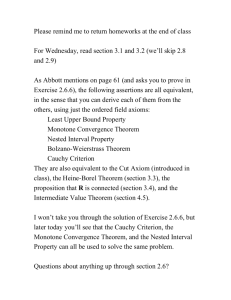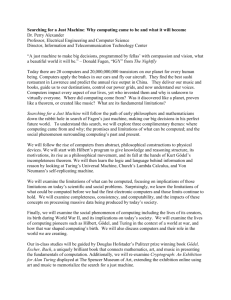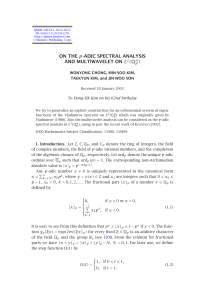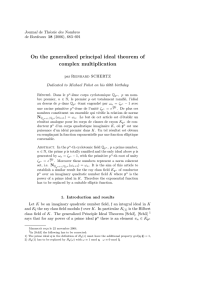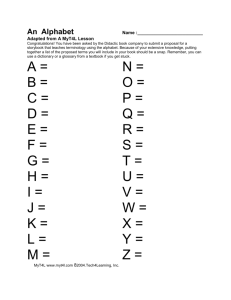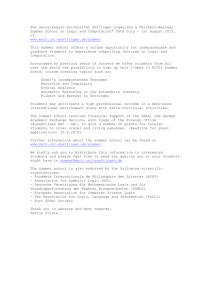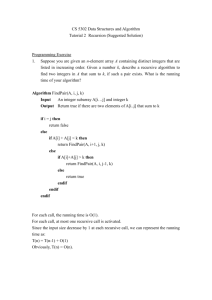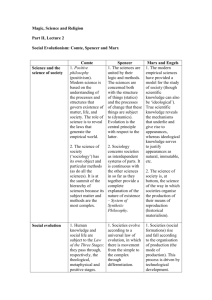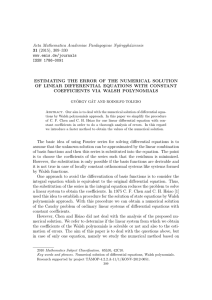Introduction to computability Tutorial 8
advertisement
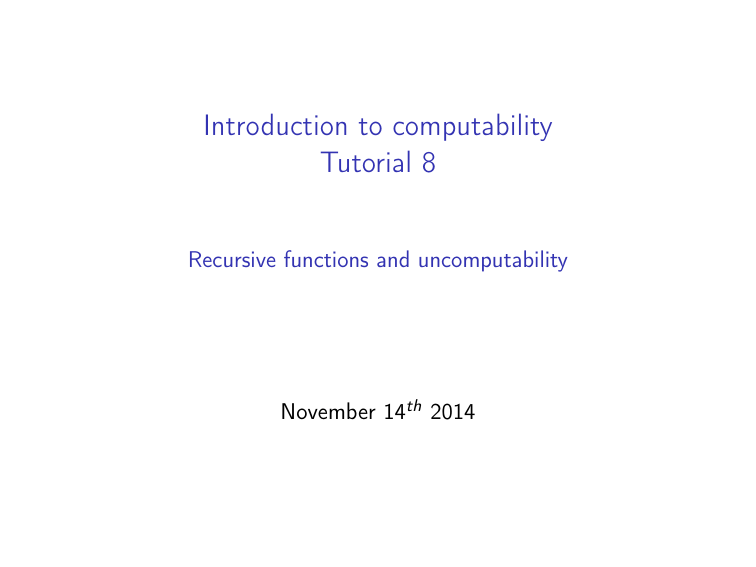
Introduction to computability Tutorial 8 Recursive functions and uncomputability November 14th 2014 1. Show that the following functions are primitive recursive: a) squarepxq that is equal to 1 if x is a square and 0 otherwise; ř b) sumSquarespxq “ xi“0 i 2 ; c) mod px, y q that computes the remainder of the division of x by y; d) dividespx, y q that is equal to 1 if x divides y and 0 otherwise; e) bounded maximization: # νi ď m qpn̄, iq “ the greatest i ď m such that qpn̄, iq “ 1 0 if there is no such i ; f) gcd px, y q that computes the greatest common divisor of x and y; g) lcmpx, y q that computes the least common multiple of x and y. Primitive recursion § Let g be a function with k arguments and h a function with k ` 2 arguments § f pn̄, 0q “ g pn̄q f pn̄, m ` 1q “ hpn̄, m, f pn̄, mqq is the function defined from g and h by primitive recursion 1. Show that the following functions are primitive recursive: a) squarepxq that is equal to 1 if x is a square and 0 otherwise; ř b) sumSquarespxq “ xi“0 i 2 ; c) mod px, y q that computes the remainder of the division of x by y; d) dividespx, y q that is equal to 1 if x divides y and 0 otherwise; e) bounded maximization: # νi ď m qpn̄, iq “ the greatest i ď m such that qpn̄, iq “ 1 0 if there is no such i ; f) gcd px, y q that computes the greatest common divisor of x and y; g) lcmpx, y q that computes the least common multiple of x and y. Bounded minimization # µi ď m qpn̄, iq “ the smallest i ď m such that qpn̄, iq “ 1 0 if there is no such i µi ď 0 qpn̄, iq “ 0 $ ’ if Di ď m ` 1 qpn̄, iq &0 µi ď m ` 1 qpn̄, iq “ µi ď m qpn̄, iq if Di ď m qpn̄, iq ’ % m`1 if qpn̄, m ` 1q ^ Di ď m qpn̄, iq 1. Show that the following functions are primitive recursive: a) squarepxq that is equal to 1 if x is a square and 0 otherwise; ř b) sumSquarespxq “ xi“0 i 2 ; c) mod px, y q that computes the remainder of the division of x by y; d) dividespx, y q that is equal to 1 if x divides y and 0 otherwise; e) bounded maximization: # νi ď m qpn̄, iq “ the greatest i ď m such that qpn̄, iq “ 1 0 if there is no such i ; f) gcd px, y q that computes the greatest common divisor of x and y; g) lcmpx, y q that computes the least common multiple of x and y. 2. Let f : N Ñ N be a function such that there exists p P N0 such that p@x P Nqpf px ` pq “ f pxqq. Show that f is a primitive recursive function. 3. Let Σ be an alphabet with k symbols and let f px, y q be a function where § x is the Gödel number of a word on the alphabet Σ § y PN The function f px, y q is the Gödel number of the word encoded by x without the y last symbols. Formally, if w “ w0 . . . wl , then f px, y q is the Gödel number of the word # w0 . . . wl´y if y ď l w1 “ . ε if y ą l Is this a primitive recursive function? Gödel number Alphabet Σ of size k. Each symbol of Σ is represented by an integer between 1 and k. The representation of a string w “ w0 . . . wl is thus gd pw q “ l ÿ i“0 pk ` 1ql´i gd pwi q. 3. Let Σ be an alphabet with k symbols and let f px, y q be a function where § x is the Gödel number of a word on the alphabet Σ § y PN The function f px, y q is the Gödel number of the word encoded by x without the y last symbols. Formally, if w “ w0 . . . wl , then f px, y q is the Gödel number of the word # w0 . . . wl´y if y ď l w1 “ . ε if y ą l Is this a primitive recursive function? Uncomputability 4. Show that the regular languages and the context-free languages are decidable. Uncomputability 4. Show that the regular languages and the context-free languages are decidable. 5. Let L1 and L2 be two languages that belong to the class RE . Show that the languages L1 Y L2 and L1 X L2 also belong to the class RE . Uncomputability 4. Show that the regular languages and the context-free languages are decidable. 5. Let L1 and L2 be two languages that belong to the class RE . Show that the languages L1 Y L2 and L1 X L2 also belong to the class RE . 6. Let M1 and M2 be two Turing machines. Show that the problem whether or not there exists a word w such that M1 and M2 both terminate on w is undecidable.

